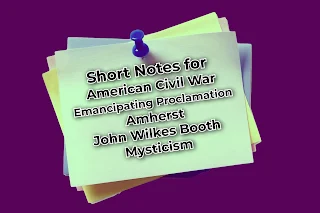Table of Contents

Short Notes for American Civil War, Emancipating Proclamation, Amherst, John Wilkes Booth & Mysticism
American Civil War
American Civil War continued from 1861 to 1865. It was a conflict between the US federal government under Abraham Lincoln, and 11 Southern states that fought to secede from the Union. It arose out of disputes over the issues of slavery, trade and tariffs and the doctrine of states' rights. Northern opposition to slavery in the Western territories caused the Southern states to fear that the existing slave-holdings, which formed the economic base of the South, were also in danger. By the 1850s abolitionism was growing in the North, and when the antislavery Republican candidate Abraham Lincoln was elected president in 1860, the Southern states seceded to protect what they saw as their right to keep slaves, They were organized as Confederate States of America under J. Davis. The War began in Charleston when Confederate artillery fired on Fort Sumter on 12 April 1861. The Union troops were led by General Grant, and the Confederate army was headed by Robert Lee. There were victories and defeats for both the armies, but ultimately the Union forces won. Lee surrendered to Grant on 3 April, 1865, and Johnston of the Confederate army surrendered to Sherman on 26 April, 1865. The War ended, with staggering casualties of 620,000 out of 2.4 million soldiers.
John Wilkes Booth
John Wilkes Booth was born on 10 May, 1838, near Bel Air, Maryland, U.S. He died on 26 April, 1865. He was an actor, and assassin of President Abraham Lincoln. Born into a family of famous actors, he achieved success in Shakespearean roles but resented the greater acclaim enjoyed by his brother Edwin Booth. He was a fanatical believer in slavery and the Southern cause. He made plans with co-conspirators to abduct Lincoln. He made several attempts, but he failed. Then he vowed to kill the president, and destroy his cabinet. On the 14th of April 1865 he shot Lincoln during a performance at Ford's Theatre. Though he broke his leg jumping from the president's box, he managed to escape on horseback to a Virginia farm. He was tracked down by defence forces, but he refused to surrender, and was shot, either by a soldier or by himself.
Emancipating Proclamation
It was an edict issued by U.S. President Abraham Lincoln in 1863. It freed the slaves of the Confederacy. On taking office, Lincoln was concerned with preserving the Union and wanted only to prevent slavery from expanding into the Western territories. But after the South seceded, there was no political reason to tolerate slavery, In September 1862 he called on the seceded states to return to the Union or have their slaves declared free. When no state returned, he issued the proclamation on 1st January, 1863. The edict had no power in the Confederacy, but it provided moral inspiration for the North, and discouraged European countries from supporting the South. It had also the practical effect of permitting recruitment of African-Americans for the Union army. By 1865 nearly 180,000 African-American soldiers had enlisted. The Thirteenth Amendment to the constitution, ratified in 1865, officially abolished slavery in the entire country.
Amherst
Amherst is the birth place of Emily Dickinson, a famous poet of America of the mid nineteenth century.
Amherst is a town in Hampshire country, Massachusetts, US, in the Connecticut River valley. The population was 37,819, according to the census of 2010. It was then the largest community in Hampshire County. The town is home to Amherst College, Hampshire College, and the University of Massachusetts, Amherst's three of the five colleges. Amherst is part of the Springfield, Massachusetts Metropolitan Statistical Area. Lying 18 miles northeast of the city of Springfield, Amherst is considered the northern most town in the Hartford- Springfield knowledge Corridor Metropolitan Region. The name of the town is pronounced as "xmarst" without the "h" sound.
Mysticism
Mysticism is the belief in the possibility of the union of man's soul with some higher spirit or force, such as Nature or a deity. The union is achieved through imagination or contemplation. It involves the subordination of reason to intention both as a means of contacting the higher force and as a source of knowledge. Forms of mysticism are found in all major religions. Buddhism emphasizes meditation as a means of moving toward nirvana. In Hinduism, the goal is the absorption of the soul in all. In Islam, sufism employs metaphors of intoxication, and of the love between bride and bridegroom to express the desire for union with the divine, English mystics and writers attempted to achieve this union in a variety of ways, some through love, some others through beauty or religion or philosophy.
